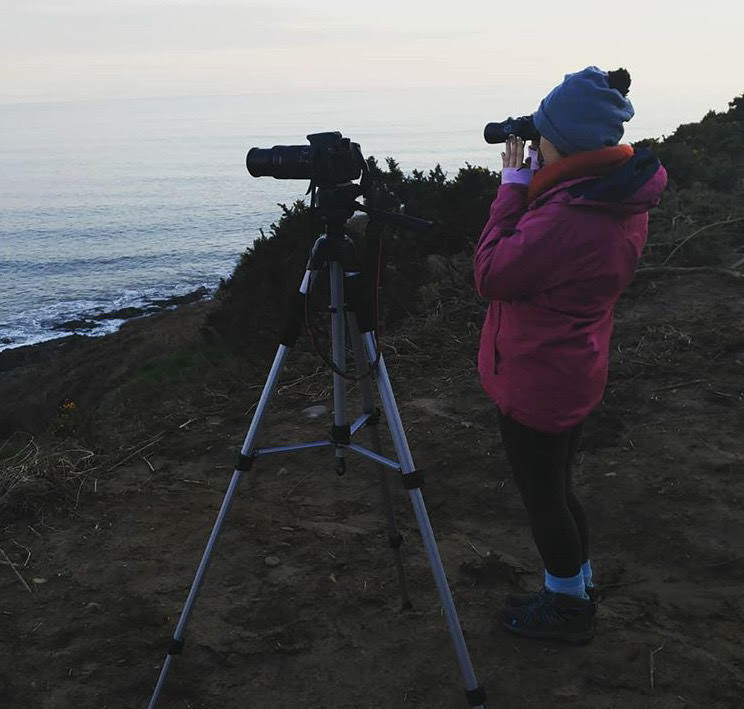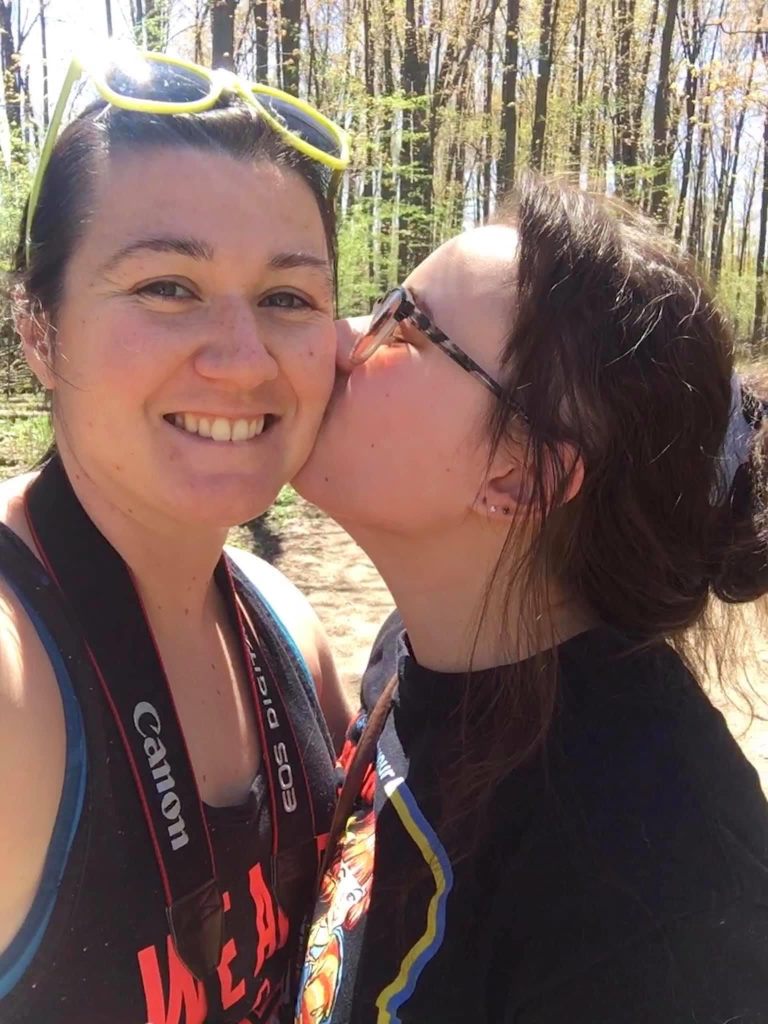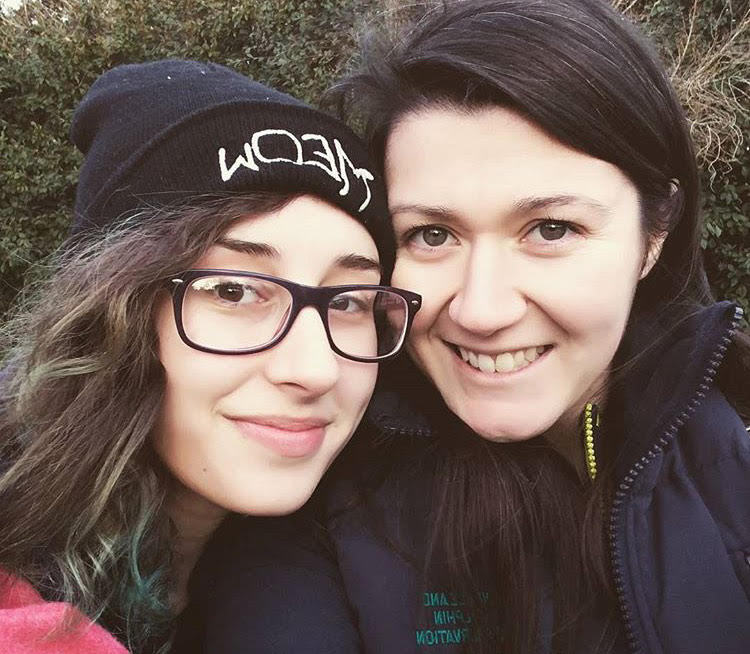Post provided by Chloe and Jessica Robinson
For LGBTQ+ Pride month, we are inviting LGBTQ+-identifying ecologists and evolutionary biologists to share their experiences of being LGBTQ+ in their field and present their thoughts on how the STEM can improve lives for LGBTQ+ individuals. For this post, wife-wife team Chloe and Jessica Robinson from Centre for Biodiversity Genomics at the University of Guelph, share their experiences of being married ecologists in STEM.
C: “Find a job you love, and you’ll never have to work a day in your life” is a quote many of us are familiar with and it is something I have always strived to achieve. In my experience, by adding “Find a job you love & someone who shares your passion and you’ll never have to work a day in your life” to this quote gives the recipe for a happy marriage also. That ‘someone’ for me is my wife, Jessica.
C: We met in 2016 when I was a PhD student, studying the application of environmental DNA (eDNA) for detecting aquatic invasive species and Jessica was a Zoology undergraduate student, at Swansea University. Our shared love for wildlife, (particularly bats and bugs), hiking and everything witch/wicca-related, soon sealed the deal for our relationship. We were both also heavily involved with promoting LGBTQ+ and women in STEM visibility, with Jessica being the Swansea University Women’s LGBT+ Officer and us both being on the Athena SWAN committee.

J: I have always loved bats and prior to meeting Chloe, I had five years’ experience volunteering with Bat Conservation Trust (BCT). It was amazing to meet someone who also loved bats and it gave me the opportunity to teach Chloe more about bat calls and how to survey for bats. Not long after we met, I started working with an independent ecologist Diana Clark at Koru Ecology Associates, where I would conduct bat surveys at locations across South Wales. It was great that Chloe could also get involved, so we both ended up working with Diana and conducting our own bat surveys to collect data for BCT’s National Bat Monitoring Program during the summer.

“We were two of only a handful of people who openly identified as being LGBTQ+ in the College of Science”
J: In terms of being in a same-sex relationship within the same department, both Chloe and I were out to our friends and close co-workers, who were aware and fully supported our relationship. At that time, we were two of only a handful of people who openly identified as being LGBTQ+ in the College of Science, let alone our Biosciences department. We were aware to keep our relationship quiet at first, due to the lack of LGBTQ+ representation in our department and being fearful of how we may be treated by our supervisors/staff members. It wasn’t until 2017 when Chloe and our openly gay, enby friend, Ben, organised a seminar for LGBTQ-identifying individuals to present their research as part of International LGBT STEM Day, that our relationship became more apparent to staff members. We are lucky that our experience of coming out in STEM was a good for both of us and this acceptance allowed us to relax into our true selves within a work environment, which is really important for overall well-being.
“We spend many days over during summer surveying dolphins by day and bats by night”
C: It wasn’t just Jessica teaching me new things about wildlife ecology, I also taught Jessica how to survey the seas for whales, dolphins and porpoises (cetaceans). Through volunteering with Sea Watch Foundation, a cetacean charity, Jessica and I volunteered our time to take part in both land- and boat-based surveys. We spend many days during summer surveying dolphins by day and bats by night!

C: In 2018, I was offered a postdoctoral position working on the STREAM project in the Hajibabaei Lab at the University of Guelph, so Jessica and I decided to get married on Halloween before hauling ourselves (and our 5 cats) to Canada. It wasn’t long before Jessica was offered a position as an Imaging Technician for insect collections in the same department as me. It is great to be working in the same building as Jessica again and it feels amazing to be in an atmosphere that allows us to be open about our relationship and our sexuality. We find that there is a lot more representation of the LGBTQ+ community at the University of Guelph at all levels (students, staff and faculty).

C: We are both proud to be ecologists within the LGBTQ+ community and we are glad our work environments are open and welcoming to all. Despite our positive experiences, we know there is still a lot that needs to be addressed with STEM regarding equal treatment of LGBTQ+ individuals, particularly for individuals from minority groups who identify as LGBTQ+. We also feel that there needs to be increased visibility regarding LGBTQ+ individuals on university websites, to help open communication channels between staff and students within the LGBTQ+ community.
C: Since COVID-19 hit Canada, Jessica and I have been working at home in lockdown together. These last few months have been blissful; we can easily work from home at our desks and get outside for walks around our local woods to record species for iNaturalist. I am so lucky to be married to someone who shares the same passions, work ethic and drive for equality among women and LGBTQ+ individuals in STEM as I do.
You can read our previous Pride Month blog post by microbial ecologist PhD student, Vishwadeep Mane here.
If you are an LGBTQ+ ecologist or evolutionary biologist and would like to contribute a blog for Pride Month, please email coordinator@methodsinecologyandevolution.org for more information.


3 thoughts on “In the Spotlight: Wife-Wife Ecologists”